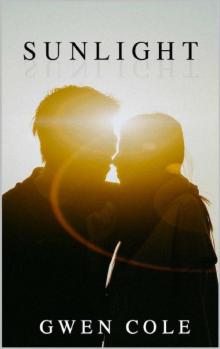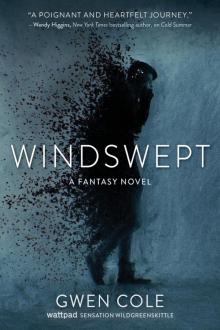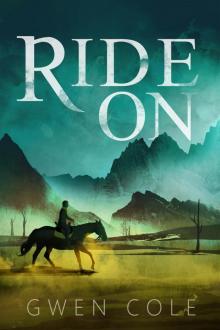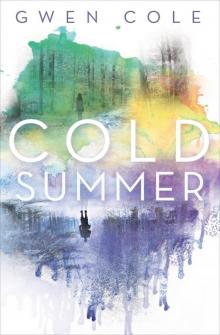Ride On Read online
Page 2
I steal a glance at Finn, whose nose is almost touching the window as he watches. His eyes are filled with worry, something I’ve been seeing more of every day.
“It doesn’t feel right,” he says, turning away. “It never used to be this bad.”
I tear my gaze off the road and pull on my boots, not bothering to tie the laces. My coat hangs next to Finn’s, wondering if it’ll be worn today. This is the first cold day we’ve had this year.
“You’re going?” he asks.
“Yeah.” I tie my bandana around my neck in case I need it. It rained a few days ago, but it’s already become dry again. “I’ve been inside all day—I need some air.”
Finn holds my gaze, torn between wanting to go with me and wanting to stay away. But he gives in, pulling on his coat and stamping his feet into his boots. We never not go, even when he pretends he might stay home.
We head outside and Finn shuts the door behind us. He’s wearing the knitted cap one of our neighbors made for him years ago. We move down our long pathway and start the short walk toward town—the mine’s entrance sits just on the other side. Our boots kick at stones along the way, and the air nips at my nose and already makes my cheeks red. The cold season is coming fast again, as it did last year.
Jack gives a huff of annoyance behind us, hating being left behind.
Finn smiles and turns around, walking backward. “Maybe next time, Jack!” he calls. The horse gives a shake of his mane and snorts. “He really doesn’t know his manners, does he?” Finn asks, turning around again. For the first time all day, he gives a quick smile.
“He gets it from you.”
“From me? Yeah, right. I think we both very well know where he gets it from.” He catches sight of more people running toward the mines, and the smile along his lips turns down. The siren has been turned off, but that doesn’t mean anything good has come from it.
“Are you going to help load the train tomorrow?” I ask. “I heard they might need extra hands since the accident last week. We could use the money.”
Finn nods, still distracted by the shouting a little ways away. The happiness his eyes held a moment ago under the shadow of his hat is completely gone.
We walk through the streets, empty now that everyone is at the mine, and quicken our pace so we don’t miss our chance of hearing anything. All the houses we pass look just like ours: small stone and wood cabins with only one or two windows each. There’s no pattern to them. When the mine opened, the houses were built wherever there was room. Unlike Kev, where the buildings were already there when the skies darkened, our town was built after with the scraps from older buildings.
We’re almost there when Axel falls into step beside Finn, pushing him in the shoulder to get one in return. The two of them have always been close enough to be brothers.
Finn shrugs off Axel so I don’t leave him behind, knowing I will. “Have you heard anything?” he asks him.
“Nope, haven’t been there yet.” Axel shoots me a grin and says, “How’s it Avery?”
“Just fine, Axel,” I say, trying not to smile. His smiles are contagious. “Your dad still owes me payment from last week. He hasn’t forgotten, has he?”
“He was hoping he could pay you tomorrow, once the Lawmen come to take the shipment,” he says. “Is that all right?”
“You know it is.”
Axel grins again. “You’ll get it, don’t you worry.”
The mine finally comes into view, cut into the side of the bare mountainside, which used to be lined with trees. They were picked clean from the ground when the town was built, and now we have to travel for miles to find more. We weave through the thin crowd of faces we know so well. Men from the mine, dirty with soot and grime, stand at the front with their families who came to see if they had been trapped. There are tears in the wives’ eyes—it could have been their husbands or sons tonight, and might be tomorrow.
We stop near the edge of the crowd and watch the entrance. The brittle wind carries the voices of the people around us. There’s still someone down below.
Finn twines his fingers with mine, undoubtedly sharing my feelings, including relief that he doesn’t have to work down there. There’s an unspoken rule of the town—if you lose a family member to the mines, you aren’t required to work in them. It’s harder to get by doing smaller jobs, but to me and Finn, it’s worth it. We may go hungry some days, but at least we stay together aboveground.
Before I was born, they used to dig for oil farther east of here. But once that dried up, new coal mines started sprouting up to keep the trains running. That’s when our town was born. The only reason for its existence.
“It’s Raymond Clarkson,” Axel says, craning his neck to see around the man in front of him. He’s taller than both of us.
I see Kari across the mine yard, doing everything she can to keep herself together. There are people around her, comforting her, but she sees none of them. She looks so young under the pale sky, younger than most of the married couples in town. If Gage were still alive, he and I would be keeping the Clarksons company in that group, though I spot Gage’s older brother across the way, covered in the same mess of those who work below. Gage has been gone more than a year now and it’s still hard to think of him. To think of the future we might’ve had if the sickness didn’t claim him. He would be standing next to us and Axel right now.
The four of us turned to three, and I always wonder when that’ll change again.
I lower my eyes, looking anywhere but in Kari’s direction. “I don’t want to be here anymore.”
Finn says, “Me either.” We both know what the outcome will be. He glances behind us and then to the sky. “It’ll be dark soon anyway. We should get back.”
He says good-bye to Axel with words I don’t hear. I don’t want to hear anything. Not the voices around us. Not the sobs coming from the families we know so well. And I don’t want to hear Kari’s screams once she finds out her husband is dead, taken too young to the thing our lives revolve around.
We walk back in silence, every step away from the mine becoming easier. At the house, we part ways—Finn goes inside to find something for dinner and I hop the fence to feed and water Jack. His wooden lean-to—along with some furniture in the house—is the last bit of wood that we own. Burning logs for the fire is expensive and we need to save our money for the winter, when we’ll need them the most.
The cloth feed sack is almost empty, but he can live off one scoop a day. The special feed we give him is costly, but without him, I couldn’t do most of the jobs I get paid for. Most days we’re traveling between here and Kev, delivering mail or getting more supplies for people in town, whatever anyone needs.
Without Jack, all three of us would go hungry.
After I check his hooves and give him a good scratch behind his ears, I head back to the house. It’s almost fully dark and only the dim flames from the candles light the inside.
I lock the door behind me and hang my coat next to Finn’s. Even though the house is cold, it still smells like home. It’s the only thing that hasn’t changed since Mom died. I join my brother in the small kitchen and set the table for two, both of us working and not talking. I would like to say this house used to be full of laughter and warmth, but I don’t think that was ever true. Not even when Dad was still here, which was years ago now. The mine took him when we turned seven, and then something entirely different took Mom just a couple years ago.
When the food is ready and making our stomachs growl, we sit down opposite of each other. Finn finally catches my eye and tries to give me a one-sided smile. We both look over to the empty seat at the head of the table, where Mom would sit and say a prayer. Thinking about her makes my heart ache, so I try not to do it for long.
Even though she isn’t here any longer, we still take a moment before eating, maybe hoping her voice would someday replace the silence. When it doesn’t, we eat our meager meal, listening to wind howl outside through the crack under the door.
I’ve spent a lot of time at this table. The wood is worn down from years of baking and schoolwork. Mom used to teach numbers and letters to Axel and Gage, too, when they came around, which was more often than she expected.
When I look up from my plate, Finn is barely touching his food. “What’s wrong?”
He blinks awake when he hears my voice, shifting in his seat.
“I went by to see Kellen today,” he says, “about helping him load the train tomorrow.” He picks at his potato with his fork, staring at it. “I didn’t want to say before when you asked.”
“And he doesn’t need your help?” Nobody ever turns him down, even when they don’t really need anything. “Who else is going to do it?”
Finn shakes his head. “That’s not it. He does need my help but—” He finally looks up. “He showed me the storage containers … and it’s not enough.”
It’s like I heard him wrong. “What do you mean, it’s not enough? The Lawmen are coming tomorrow. It’s been a month.”
“I’m saying it’s not enough,” he says. “There’s barely half of what we need to give them.”
“But if we don’t give them the coal, nobody will get paid—” I don’t know what else to say but I feel there’s more. “Why isn’t there enough?”
“He didn’t say, but I think it has to do with the accidents lately. We both know there’s been a lot more within the last few months, especially these last weeks.” He bites the corner of his lip and his eyebrows come together—both signs he doesn’t want to say something. “I think that’s the last of the coal. They’re getting desperate to find more, and that’s why there’ve been more accidents. The mine is dead.”
I haven’t eaten anything since this morning, but the thought of food makes me sick. Mom’s empty chair looms beside me. She would know what to say and do. Always did.
“Avery.” At the tone of Finn’s voice, I look up. “I think we might need to leave.”
It’s not something I ever thought I would hear. We trade with the Lawmen for payment in return—that’s what we’ve always done. We don’t live in the Wild because we don’t have to.
I’m shaking my head before I even realize it. “We can’t leave, Finn. This is our home. The very home Dad found before we were born, so we could stay here without any worry about freezing to death at night or fending off gangs. You know that as well as I do. He and Mom raised us here so we would be safe.”
I can’t think about leaving our home and our neighbors. The people I’ve known my whole life.
“Do you think I want to leave, Ave? I don’t just as much as you, but I don’t think we have a choice. The coal is gone, and without it, nobody gets paid. And if nobody gets paid, they can’t buy anything. You know what that means,” he says softly. “You’re not only out of a job, but nobody will be able to live here anymore. Everyone will have to leave. How are we supposed to survive if it’s only us?”
“You don’t know what it’s like in Kev.” My throat tightens with the thought of actually living there. “That place is hell. Every time I go there, I can’t help thinking maybe I won’t come back. The people there—they’re not like everyone here.”
“I know, but I don’t think we have much of a choice. What else can we do?”
I want a logical answer to pop into my head and tell me everything I need. Nothing comes because he’s right. I don’t like it, but he’s right.
“What if they start a new mine?”
“You know it’s not that easy. It’ll take years just to find another coal sight, and all the close ones are already claimed.”
Finn reaches his hand across the table and slips something into mine. I don’t have to see it to know what it is. The smooth wood brushes against my palm. I know every inch of it better than anything else.
“Wherever we end up, we’ll be together,” he says. “I promise.”
I curl my hand tight around the small wooden horse, still able to feel the warmth of him holding it. I will always remember the day Dad carved it for us. The season was well into winter—the windows frosted with snow and the storm howling at us to stay indoors. The whole town was snowed in for weeks. We were six. Our birthday had only been a few days earlier and Dad felt bad he couldn’t get us anything.
But Dad pulled out this old piece of wood he’d been saving—for what, I still don’t know. Sometimes I think he saved it because he liked to be reminded of the world he came from. The one we never knew. When the sky was an actual color instead of gray. When there were trees on the mountains and along the river. That small chunk of wood was the only proof he’d survived.
When the horse finally took shape from that piece of wood and he rubbed the last shavings off his leg, he gave it to us to share. First every other hour, and then every other day. Then those days turned into weeks and months.
Now whenever we hand over the small horse, it’s because the other person needs it more. It reminds us that we have each other, no matter where we are or how much distance separates us.
“You’ve had this for a while,” I say.
“I’ve been selfish.”
I try to smile. “I never thought we would leave here,” I admit, tears welling behind my lashes. “It scares me.”
“It scares me, too,” he says. “But who knows? Maybe something good will come of it. And the most important thing is we’ll be together.”
I smile at his attempt to lighten the mood.
Instead of finishing our dinner, we save the food for tomorrow and go to bed. In the cold season, we normally stay up longer, spending time in front of the fireplace before slipping into our cold beds.
But now I don’t know if we’ll ever have that again.
I still try to imagine what the suns looks like and how it feels. The books we have on our small shelf only tell us so much, but Mom used to describe it to us when we asked her to. Big and bright. Warm.
It’s something I have a hard time believing.
Because all we’ve ever known is a brown earth and a gray sky.
3.
Seph
If I had a choice, I would circle around this town so wide the dogs couldn’t even pick up our scent.
Nothing good comes from this place. Even Cade knows it, but his stomach is telling him otherwise, and so is mine. We need to eat.
We watch the town from a distance.
People walk to and from the old buildings, but from this far away, there’s no way of knowing what kind of people they are. I’ll find out when I’m there—when it’s too late and I’m too close to them.
“What do you think, Cade?”
He says nothing, just a twitch of an ear.
“Yeah, me too.”
I gather the reins and Cade starts forward with his ears pricked, hearing everything I can’t. Going into towns is dangerous; I don’t know if they’ll take my money like civilized humans or pull me off my horse the first chance they get.
It’s the risk I’m willing to take.
It’s the risk I have to take.
The town is small. Maybe it used to be bigger before they tore down the surrounding houses to fix the ones in the center, but with the dust hiding everything, it’s hard to tell. Windows still stand here and there, and the rest of the holes are boarded up. Boarded windows are always a sign of people living inside. I like the abandoned towns where the buildings are full of holes and the silence is only broken by an old swinging door. Sometimes I even get lucky and find something good that the scavengers missed.
My hand rests near my gun as we pass the first buildings. Work has stalled and heads crane in my direction. They stop everything to watch me with dull eyes. Not a good sign. There are no kids here. No laughter. So many things missing to make this place wrong.
I feel and hear everything—my bandana brushes against my neck, my short hair pulls with the breeze, hammering pauses and rings into a silence, and even a chain clangs against a gate somewhere to my left.
And then the eyes. They see right through to my
bones. They’re either warning me to leave or welcoming me, but I’m afraid to know the answer.
The buildings are crudely marked. Old signs have been painted over and others have marks scarred into their walls. The shop is located in the center of town, in a structure with wide pillars in the front, made from something similar to stone, except smoother. The only two windows are barred on the outside—the only reason they haven’t broken.
The moment I dismount, the sound of work continues, like they don’t want to be caught looking for too long. Ignoring my tightening stomach, I take off my ball cap and fold it into the saddlebag. My coat is already inside—the day started out oddly warm. Then I unstrap the opposite bag, full of my money and things to trade, and sling it over my shoulder.
I don’t want to be here longer than I have to, so I leave Cade’s reins slung loosely over his neck.
“I’ll be right back,” I tell him. He only snorts in return.
I walk up the cracked steps and head inside, where daylight seems to have a hard time reaching. I’ve never liked the absent feeling of the sky on my shoulders. The walls threaten to close in around me, but I continue without pause.
The man behind the counter is balding, wearing a tattered sweater with printed grizzly bears across the chest. He doesn’t notice me, too focused on fixing a radio in his hand. I do a quick sweep of the room and find no one else. When I start across the hardwood floor, counting my steps and taking note of exits, the man finally looks up and flinches, almost dropping the old radio.
Nobody likes being surprised. One of his hands reach for something under the counter and pauses there. A gun. I don’t have to see it to know.
I hold up my hands as I approach, stopping a foot away.
“You aren’t from around here,” he says, flicking his eyes from my pistol to my face.
“Just passing through. I don’t want to cause any trouble.” I lower my hands, keeping them away from the holster hanging from my hip in case he has a twitchy finger. “All I need are supplies. Then I’ll be on my way.”
He nods, still surveying me. “Can you pay? We don’t do donations here. Especially to outlaws.”

 Sunlight
Sunlight Windswept
Windswept Ride On
Ride On Cold Summer
Cold Summer